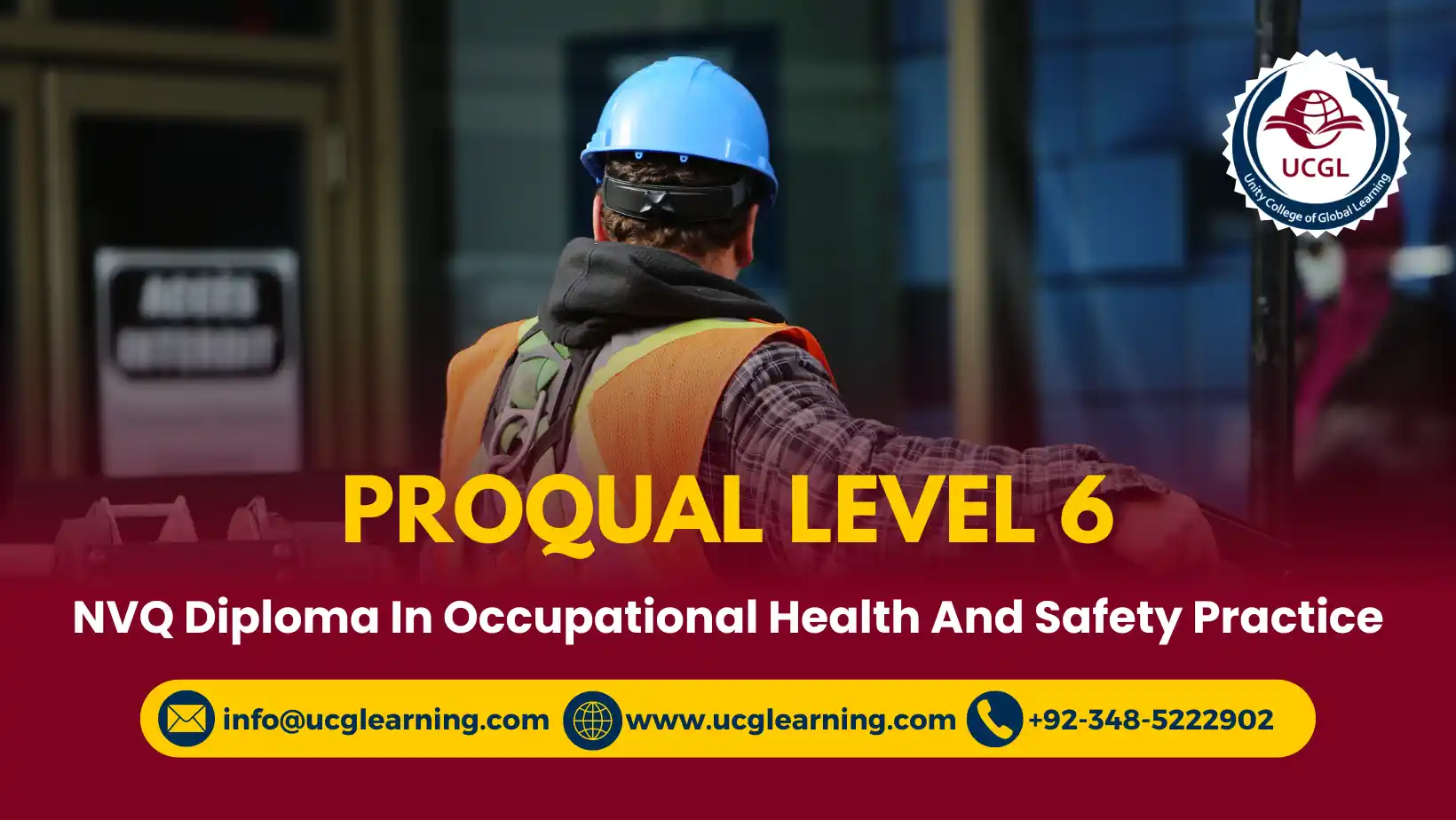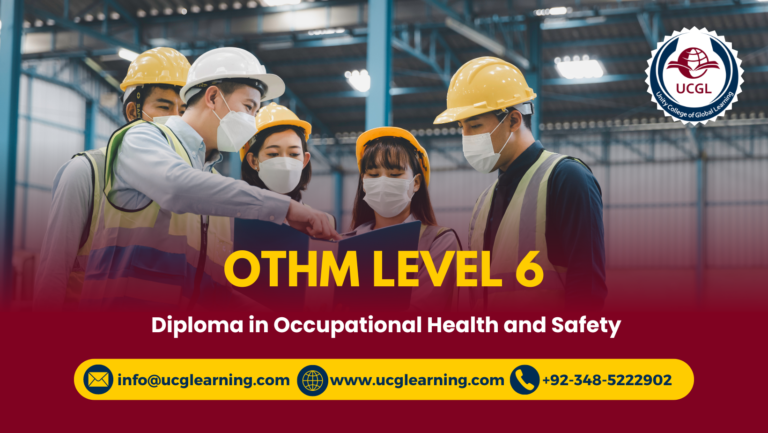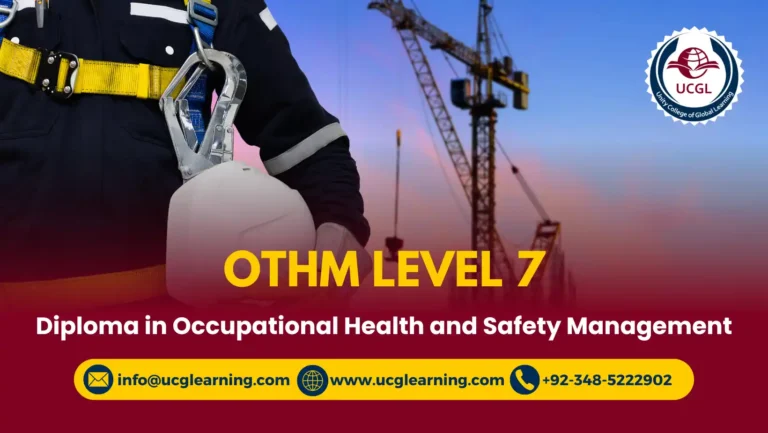ProQual Level 6 NVQ Diploma in Occupational Health and Safety Practice
In today’s rapidly evolving workplace landscape, ensuring the health and safety of employees has become paramount. Employers across industries are increasingly seeking professionals who possess a comprehensive understanding of occupational health and safety practices. For those aspiring to excel in this field, the ProQual Level 6 NVQ Diploma in Occupational Health and Safety Practice stands as a beacon of opportunity, offering a structured pathway towards expertise and career advancement.
Embarking on the ProQual Level 6 NVQ Diploma in Occupational Health and Safety Practice is more than just a qualification—it’s a commitment to excellence, professionalism, and continuous learning. With our industry-leading curriculum, expert instructors, and unwavering support, we’re here to help you achieve your career goals and make a lasting impact on workplace safety.
Are you ready to take your career to new heights and become a leader in occupational health and safety? Join us on this transformative journey with the ProQual Level 6 NVQ Diploma. Together, we’ll shape safer, healthier workplaces for generations to come.
Course Overview
The ProQual Level 6 NVQ Diploma in Occupational Health and Safety Practice is designed to equip learners with the knowledge, skills, and competencies necessary to effectively manage health and safety in the workplace. Recognized internationally, this qualification provides a solid foundation for individuals aiming to pursue a career in occupational health and safety or advance within their current roles.
The ProQual Level 6 NVQ Diploma is more than just a qualification; it’s a testament to your commitment to creating safe and healthy work environments. This diploma is designed to equip learners with the knowledge, skills, and practical experience necessary to excel in the field of occupational health and safety. Whether you’re already working in the industry or looking to transition into this critical field, this diploma provides a solid foundation for your career aspirations.
One of the key strengths of the ProQual Level 6 NVQ Diploma is its comprehensive curriculum, covering a wide range of topics essential to effective health and safety management. From risk assessment and incident investigation to legal compliance and emergency response, each module is carefully crafted to provide learners with practical insights and real-world solutions. With a focus on hands-on learning and case studies, this diploma ensures that you not only understand the theory but can also apply it in diverse workplace scenarios.
Course Benefits
- Comprehensive Curriculum: The course covers a wide range of topics, including risk management, legislation compliance, incident investigation, and workplace ergonomics, ensuring learners acquire a holistic understanding of occupational health and safety practices.
- Practical Application: Emphasizing practical skills development, the course integrates real-world scenarios and case studies, enabling learners to apply theoretical knowledge to practical situations.
- Recognition and Accreditation: Upon successful completion, learners receive a ProQual Level 6 NVQ Diploma, a globally recognized qualification that enhances employability and credibility in the field.
- Flexibility: The course offers flexibility in terms of study options, allowing learners to pursue it alongside their professional commitments through distance learning or part-time study.
Course Study Units
The ProQual Level 6 NVQ Diploma in Occupational Health and Safety Practice consists of 10 mandatory units. Candidates must complete all of the following Mandatory units.
- Promote a positive health and safety culture
- Develop and implement the health and safety policy
- Develop and implement effective communication systems for health and safety information
- Develop and maintain individual and organisational competence in health and safety matters
- Identify, assess and control health and safety risks
- Develop and implement proactive monitoring systems for health and safety
- Develop and implement reactive monitoring systems for health and safety
- Develop and implement health and safety emergency response systems and procedures
- Develop and implement health and safety review systems
- Maintain knowledge of improvements to influence health and safety practice
Learning Outcomes
Upon completion of the course, learners are expected to:
- Promote a Positive Health and Safety Culture:
- Understand the importance of fostering a positive health and safety culture within the organization.
- Implement strategies to promote employee engagement and participation in health and safety initiatives.
- Advocate for a proactive approach towards health and safety, emphasizing the collective responsibility of all stakeholders.
- Develop and Implement the Health and Safety Policy:
- Draft a comprehensive health and safety policy aligned with legal requirements and organizational objectives.
- Implement procedures for communicating the health and safety policy to all stakeholders.
- Ensure regular review and update of the health and safety policy to reflect changes in legislation, standards, and organizational needs.
- Develop and Implement Effective Communication Systems for Health and Safety Information:
- Establish channels for effective communication of health and safety information throughout the organization.
- Develop clear and concise communication materials, including signage, memos, and training materials.
- Facilitate training sessions and workshops to enhance awareness and understanding of health and safety protocols among employees.
- Develop and Maintain Individual and Organisational Competence in Health and Safety Matters:
- Identify training needs and develop a competency framework for employees at all levels.
- Implement training programs to equip employees with the necessary knowledge and skills to fulfill their health and safety responsibilities.
- Monitor and evaluate the effectiveness of training initiatives and provide ongoing support and development opportunities.
- Identify, Assess, and Control Health and Safety Risks:
- Conduct comprehensive risk assessments across all areas of the organization.
- Implement control measures to mitigate identified health and safety risks, prioritizing prevention and protection measures.
- Regularly review and update risk assessments to address changing hazards and circumstances.
- Develop and Implement Proactive Monitoring Systems for Health and Safety:
- Establish proactive monitoring systems, such as inspections and audits, to identify potential health and safety issues.
- Develop key performance indicators (KPIs) to measure the effectiveness of health and safety initiatives.
- Implement corrective actions to address deficiencies and improve overall health and safety performance.
- Develop and Implement Reactive Monitoring Systems for Health and Safety:
- Establish procedures for reporting and investigating incidents, accidents, and near misses.
- Analyze root causes of incidents to prevent recurrence and improve safety protocols.
- Implement measures to support and rehabilitate affected employees and minimize the impact of incidents on the organization.
- Develop and Implement Health and Safety Emergency Response Systems and Procedures:
- Develop emergency response plans for various scenarios, including fire, chemical spills, and medical emergencies.
- Conduct drills and simulations to test the effectiveness of emergency response procedures.
- Coordinate with external agencies and stakeholders to ensure a coordinated response in the event of emergencies.
- Develop and Implement Health and Safety Review Systems:
- Establish mechanisms for conducting regular reviews of health and safety performance.
- Analyze trends and patterns to identify areas for improvement and innovation.
- Implement continuous improvement initiatives based on review findings to enhance health and safety outcomes.
- Maintain Knowledge of Improvements to Influence Health and Safety Practice:
- Stay abreast of advancements in health and safety technology, best practices, and regulations.
- Actively participate in industry forums, conferences, and training programs to exchange knowledge and ideas.
- Advocate for the adoption of innovative solutions and practices to continually improve health and safety performance within the organization.
Who is the Course For
The ProQual Level 6 NVQ Diploma is ideal for individuals working in roles such as health and safety managers, officers, advisors, consultants, or anyone responsible for managing health and safety within their organization. It is also suitable for those seeking to transition into a career in occupational health and safety or advance within the field.
Future Progression
Upon completion of the ProQual Level 6 NVQ Diploma, learners can explore various avenues for career progression, including:
- Pursuing further education: Graduates may choose to pursue advanced qualifications such as a Master’s degree in Occupational Health and Safety or related fields to deepen their expertise and broaden their career prospects.
- Specialization: The qualification opens doors to specialize in specific areas of occupational health and safety, such as environmental health and safety, construction safety, or industrial hygiene.
- Leadership Roles: With their enhanced skills and knowledge, graduates are well-positioned to take on leadership roles within their organizations, such as health and safety managers or directors.
- Consultancy: Experienced professionals may opt to establish their consultancy firms or work as independent consultants, providing expert advice and assistance to organizations across industries.
ProQual Level 6 NVQ Diploma in Occupational Health and Safety Practice offers a valuable opportunity for individuals to acquire the expertise and credentials needed to thrive in the dynamic field of occupational health and safety. With its comprehensive curriculum, practical focus, and global recognition, the qualification serves as a catalyst for career advancement and professional growth in this essential field.
Unity College of Global Learning is offering ProQual Qualifications in association with Inspire College of Technologies (ICTQual) Uk.




